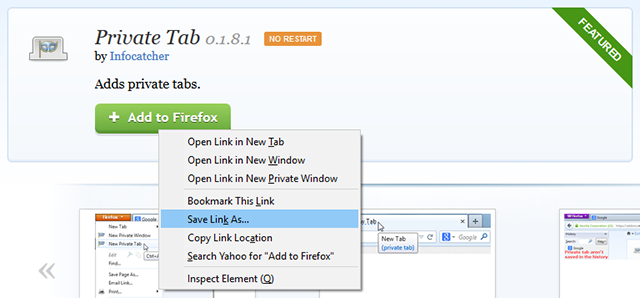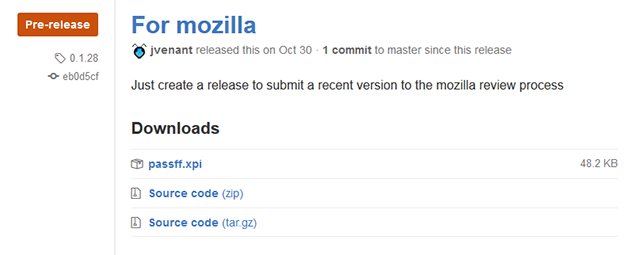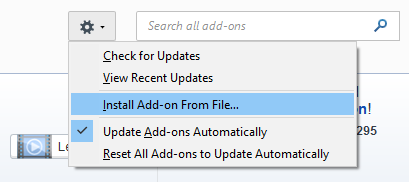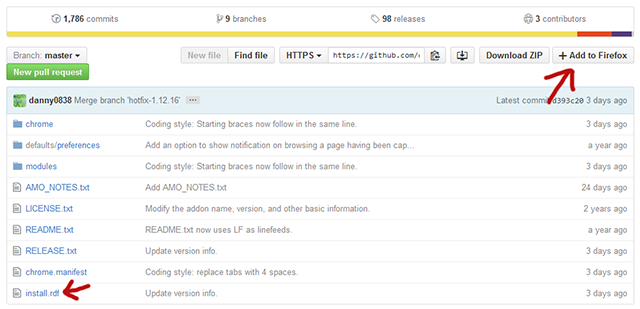

Can you imagine Firefox without add-ons? Not that there’s anything necessarily wrong with a basic Firefox installation, but many would argue that the greatness of Firefox rests in its open nature and the vast availability of add-ons for extended functionality.
Seriously, even just a few of these recommended Firefox add-ons can completely change your web browsing experience, not to mention that add-ons can also increase your privacy and security on the Web. It’s worth your while to start using add-ons if you aren’t already.
But while most of us just download the add-ons available on the Firefox site, there’s a whole world of lesser-known add-ons that you have to download elsewhere and install manually. Here’s how to do that.
Instead of installing straight from the Firefox site, you can actually download add-ons as individual files. This is useful in case you want to save a particular version of an add-on or the site’s installation link just doesn’t work for some reason.

First, go to the Add-ons repository and find the add-on you want to download.

Next, find the big button labelled Add to Firefox. Right-click on it and select Save Link As…. When the prompt shows, feel free to rename it to whatever you want, but make sure to keep the .XPI file extension. That’s it! Download complete.
Of course, as mentioned earlier, there are also Firefox add-ons that you can’t find on the official site and can only find on places like GitHub (which is a repository of open source projects).
Fortunately, even if you’ve never used GitHub before, the download process is just as simple:

First, find the add-on you want. If you have a direct link to a particular project, just move onto the next step. Otherwise, you can browse GitHub for “firefox addon” and you’ll find hundreds of them (sort by “Most Stars” to filter out the crummy ones).

On the project page, look near the top for a link called Releases. If at least one release exists, click the link to go to the releases page. (If there aren’t any releases, skip down to the “No releases?” paragraph.)

On the releases page, browse for the latest version. By default, release pages are sorted with the latest release at the top, so it should be the first one you see. Look for an .XPI file download. If you don’t see it, download the .ZIP file, which should contain the .XPI within. Done!

No releases? If a project doesn’t have any releases, there’s a good chance the .XPI file is available somewhere in the project itself. Navigate the folders until you find it, then right-click on it, select Save Link As…, and name it whatever you want but keep the .XPI file extension. Done!
Once you have an .XPI add-on file (if you don’t, refer to the above section), installing it on Firefox is somewhat intuitive and rather straightforward.
First, open the Add-ons Manager. In the sidebar, navigate to the section called Get Add-ons. Along the top, look for the pulldown menu with a gear icon, click on it, and select the Install Add-on From File… option.

When the prompt shows, navigate to the .XPI file you downloaded. You should get a popup asking if you want to install it, in which case you should click Install. And that’s the end of it!
Alternatively, you can just drag-and-drop the .XPI file onto your Firefox window, which basically accomplishes the same thing.
If you’re going to be regularly installing add-ons from GitHub, there’s a faster method that you can use — and it allows you to discard everything mentioned above. It’s incredibly simple and you’ll love it.
Just go to the Firefox site and install the GitHub Extension Installer add-on.

Once the add-on is installed, you can go to any GitHub-hosted add-on project and install it with one click using the new button that’s available. Done!
The only downside is that this method only works if the project is organized correctly (meaning that it has an install.rdf file in the root directory). If the install file is missing, you’ll have to fall back on the manual method above.
As you can see, the process of manually downloading and installing Firefox add-ons isn’t hard at all — and if you’re grabbing add-ons from GitHub, it’s easier than ever. If any of the instructions were unclear, please leave a comment and I’ll do my best to clarify.
But now it’s your turn: which Firefox add-ons do you consider to be the most essential? Which ones can’t you live without? Tell us in the comments below!




 Civilization V: DLC Done Right
Civilization V: DLC Done Right Sonic Generations Walkthrough
Sonic Generations Walkthrough Mortal Kombat X Guide: How to Play Johnny Cage
Mortal Kombat X Guide: How to Play Johnny Cage Dark Souls 2 hints and tips for survival
Dark Souls 2 hints and tips for survival Fallout 4: Kidnapping walkthrough
Fallout 4: Kidnapping walkthrough